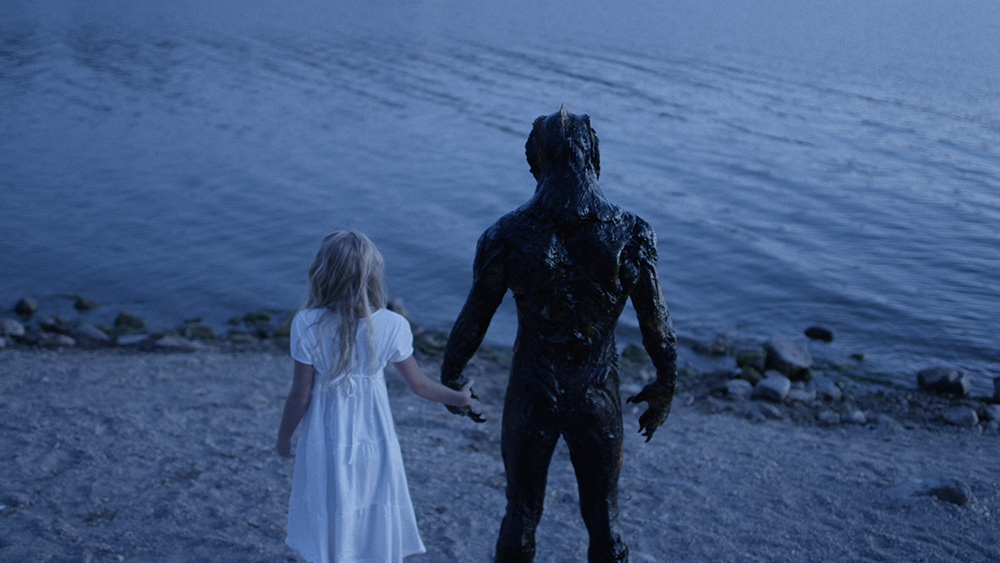I tuned into House by the Lake (2017) immediately after learning Adam Gierasch had directed it. Gierasch wrote the screenplay for ‘Mother of Tears’ (2007), the final part in Dario Argento’s The Three Mothers Trilogy which began with the ethereal ‘Suspiria’ (1977). Unlike Argento’s work, this feature follows a relatively different approach, and is more character oriented than atmospheric. Like many modern horror films, it stays away from retro-horror’s emphasis on style, and focuses on contemporary topics of broken relationships and autism.
I found the trailer to be quite misleading, because this doesn’t work like conventional horror. It treads more along the lines of a slow-burning thriller with the final act acting as a strong metaphor, which may puzzle many viewers. It stands out as an oddity, but is a necessary and brutal conclusion to the film’s dominating theme. House by the Lake is structurally reminiscent of Karyn Kusama’s ‘The Invitation’ (2015), but with a pinch of the otherwordly.
The premise follows a struggling married couple, Scott and Karen, as they try to bond with each other at a lake house, for the sake of their only daughter, Emma. But the unusual isolation only proves out to be detrimental, as things spiral out of their control due to Emma’s weird mannerisms, triggered by a mysterious entity which is only depicted in drawings, something right out of ‘Stranger Things’. I’d be breaking down the film to review the key aspects which means, *Spoilers Ahead*.
The Cause : The Husband and The Wife

Scott and Karen’s immaturely planned out marriage reflects the situation of many young couples across the world. Though the dynamics aren’t explicitly laid out, Karen’s reluctance is evident from the first scene involving the therapist. The couple do share some sweet moments, but they appear to be fostered by persistence and not love, the final moments of joy before the end. Now, the root of Emma’s autism is unknown but there’s a constant sense of suspicion over the couple’s impaired bonding worsening her condition. The film utilizes quite a lot of tropes to depict the rocky relationship, apart from James Callis and Anne Dudek’s effective performances. The tension injected by the duo is very realistic, and impressively redeems the insubstantial plot during the first two acts. House by the Lake gladly doesn’t build on those tropes though, which puts the viewer on the back foot regarding the direction of the story.
The Symptom : The Fish Man and Emma

As a result of the heightening tension between the couple, Emma ends up finding comfort in an entity that’s considered abnormal by the society, very similar to her own self. A surprising aspect is Emma’s assumed “fear of water”. We see her retorting to water in the presence of her parents, notably the scene in the car. But as the movie progresses, we feel her sharing a serene yet unseen bond with water, as if the lake’s overwhelming presence soothes her. The scene where they find her in the filled tub, surprisingly functioning normally, further proves how the fear actually stems from her undesired role in the family. It’s all the more disheartening to see her settle for something bad, instead of the worst.
There’s also the question of the Fishman’s identity that arises due to the old neighbor’s uncanny appearances. Michael Bowen from ‘Breaking Bad’, is unnerving as a stranger who surprisingly interacts calmly with Emma, and is later found to be a sex offender. Though the movie hints towards his death when Emma goes missing, the Fishman’s revelation and his disappearance does raise a striking doubt behind the old neighbor’s motive to befriend Emma.
The Outcome : There Is No Catharsis

In the final shot we see Scott and Karen holding hands, but this is undoubtedly a bittersweet embrace. Emma’s departure is permanent and no developments in their marriage can fix that void. Usually films that end with the couple driving far away from their private hell symbolize the beginning of a new future. But I believe that’s not the case here, and the firm embrace means the secret is always going to be locked within them. The film opens with a therapy session, but ends with tragedy to inform the couple about the essence of their bond. The contrasting parallels may not be constructed with measured subtlety, but they are hard hitting.
Final Thoughts

What I liked about the movie was its unhesitance towards a nihilistic conclusion, a trait rarely found in modern horror films. The final act is snappy and tonally jarring, which leaves you disappointed about the reconciliation you wished for. This would be a letdown for many, but turns horrifying when you wrap your head around the possibilities that justify the Fishman’s existence.
Lovecraftian horror associates itself with the unknown or the unknowable. The Fishman despite his explicit appearance, exists tangentially to our conception of a monster. He’s unknowable because his true self can only be realized by Emma. Her parents and the audiences are mere spectators to this unworldly connection. The movie also does a great job in establishing a role reversal, its only motive. The parents, who are supposed to be Emma’s guardians, not only on the basis of biology, turn into the spectres of this film.
‘House by the Lake’ adopts artistic liberty in aggravating the mental brutality faced by children in homes that do not reside families, but separate human beings. It points out how adults can be helpless too, and in that condition, the inability to extend help to their children only forces young minds unable to conceive rationality, to help themselves.


